Training, internships and work experience

Here you will find all the information you need about training opportunities at the Semperoper as well as in the shared workshops of Dresden State Opera (Semperoper) and the Staatsschauspiel Dresden:
- Apprenticeships
- Internships
- Voluntary service within BFD Culture and Education
- Work experience
Apprenticeships at the Semperoper and in the workshops of Saxon State Theatres
- Scenic artist and theatrical sculptor
- Specialist for event technology
- Tailor specialising in women’s and men’s clothing
- Media designer
- Metalworker specialising in construction
- Set dresser
- Shoemaker
- Carpenter
Contact
Sächsische Staatstheater –
Staatsoper Dresden und Staatsschauspiel Dresden
HR Department
Theaterplatz 2
01067 Dresden
Phone +49 351 4911 253
E-mail bewerbung@saechsische-staatstheater.de
Scenic artist and theatrical sculptor specialising in stage work
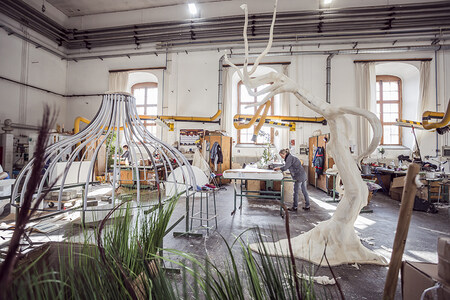

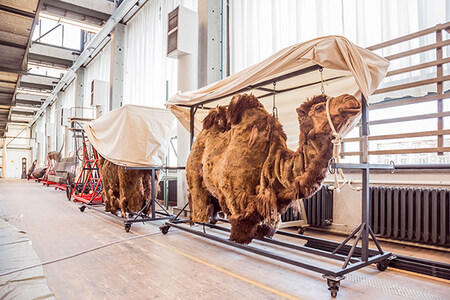
Scenic artist and theatrical sculptor are related professions in the field of set design. Their task is to realise the plans of set designers using all the techniques of drawing, painting and sculpture. For the scenic artist, the focus is on decorating props and painting backdrops while the theatrical sculptor produces diverse objects (columns, figures, animals, furniture, reliefs, etc.) using a wide range of materials (e.g. polystyrene, clay, plaster, stone or plastics). The techniques and styles are varied, with designs coming from the genres of landscape, architecture, portraiture or figurative painting as well as anatomy, texts and ornaments.
Requirements
In addition to the entry qualifications, applicants must have the following skills and aptitudes: an interest in theatre, a gift for art and manual dexterity, artistic sensitivity, a good spatial imagination and the ability to think in three dimensions, good colour vision, stamina and the ability to remain focused while under pressure. As scenic artists and theatrical sculptors often work in a standing or stooped posture and are frequently exposed to paints and solvents, it’s essential that apprentices have no underlying physical impairments that could prevent these activities and no relevant allergies.
Apprenticeship
The apprenticeship as scenic artist and theatrical sculptor takes three years and ends with an examination set by the Chamber of Industry and Commerce. In addition to the main in-house training in the scenery workshops, apprentices also attend vocational school.
Specialist for event technology
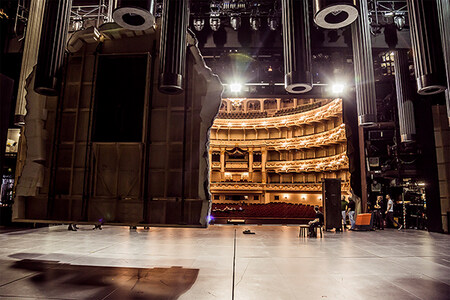

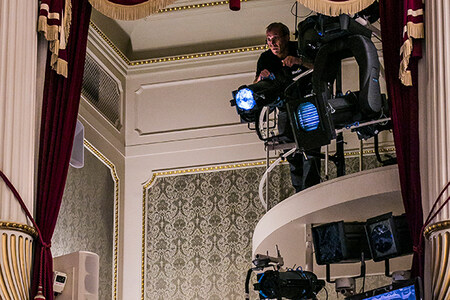
Event technology specialists work in the technical department of a theatre where they operate and look after all of the on-stage equipment. This still young profession essentially combines the jobs of the stage technician, lighting technician and sound/video technicians. It was created to meet the requirements of modern technical systems that are commonly used at entertainment events. In the theatre, event technology specialists can be employed to assist in all areas of stage technology.
Requirements
Anyone who wants to work as an event technology specialist at the theatre should have an interest in technology and be prepared to deal with the unique conditions imposed by artistic performances. S/he has to run the technical stage systems during rehearsals and performances in the theatre and be familiar with the artistic concept of any production so that s/he can also work in real-time to ensure the perfect realisation of a live performance.
The following skills are required: technical expertise, manual dexterity, creativity in solving technical & artistic problems, the ability to work in a team, reliability, a sense of responsibility, a willingness to work irregular hours and the ability to work under pressure. In many areas, computer and English skills can be useful.
Apprenticeship
An apprenticeship to become a specialist for event technology last three years and encompasses the following areas: event design and safety; the provision, setting up, testing, securing, transportation and storage of equipment; the operation of stage equipment; energy supply; lighting, sound and public address systems; the recording and transmission of light, image and sound data; special effects; the planning and staging of events; and the use of modern media.
Make-up artist
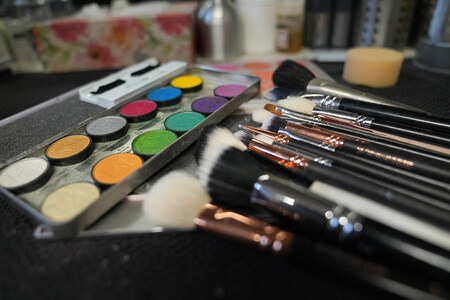
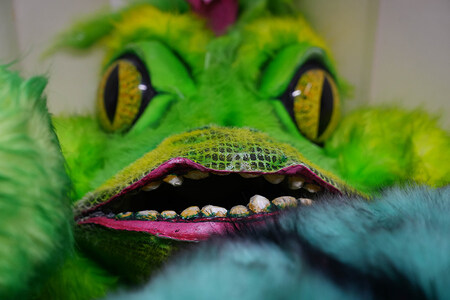
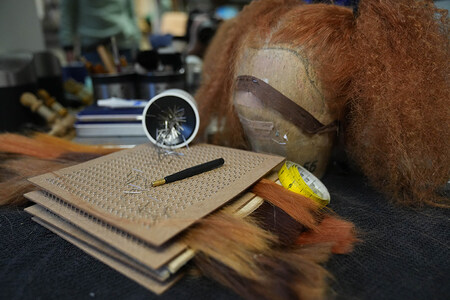
Make-up artists are engaged in a broad and creative field of work in which they (re)design faces, bodies and hair. They apply make-up, design hairstyles and make (parts of) masks. In each case, it is important to know exactly which person will wear the mask. Dancers, singers and other performers all have different needs when they are on stage.
The make-up work supports and completes the appearance of performers. For this, it is essential to know the source material of a play/opera and to have a wide-ranging cultural education and insight into the current aesthetic discourse. Creative and practical solutions are required to implement the concept for each character as agreed with the stage director and their team.
Requirements
Make-up artists need to be fascinated by the world of theatre. Important prerequisites for make-up artists are creativity, a highly developed aesthetic sense, great artistic sensibility and powers of expression as well as manual skills. Good social skills, adaptability as well as sensitivity in dealing with performers are all essential to the profession and help make the work easier.
Physical stamina, flexibility in working hours and the ability to work in a team are further important traits of make-up artists. A fine aesthetic perception and the ability to express yourself artistically and technically are also vital prerequisites for the profession.
Apprenticeship
It usually takes three years to train as a make-up artist. Apprentices attend vocational school while also training directly at the theatre and its workshops.
Tailor for women’s and men’s clothing
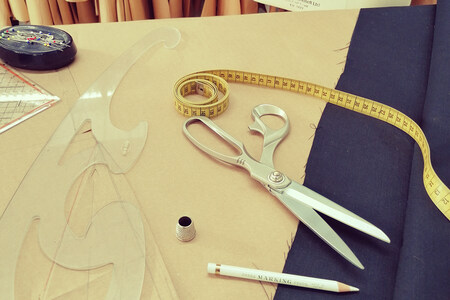
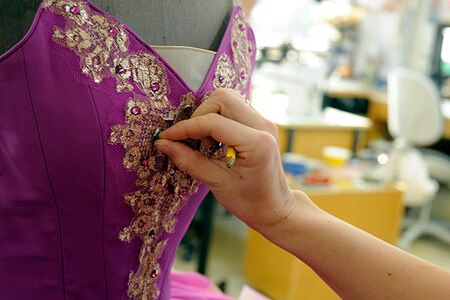
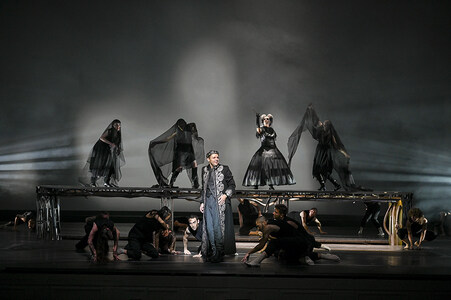
Under the supervision of the wardrobe mistress/master, the tailor for women’s or men’s clothes makes the costumes designed for a production by the costume designer.
In addition to classic garments such as blouses, skirts, trousers and jackets, the tailors in the costume department also make opulent dresses, richly decorated tutus and ballet costumes as well as elaborate fantasy costumes from unconventional materials. With great attention to detail and a good knowledge of the history of clothing, they reconstruct historical costumes of all eras.
Requirements
If you want to learn the profession of tailor for women’s or men’s clothing, you should possess good manual dexterity, a strong imagination, sufficient patience to complete painstaking designs and a willingness to learn so that you can always adapt to unfamiliar and unusual designs and materials.
Apprenticeship
An apprenticeship to become a tailor usually takes three years.
Media designer
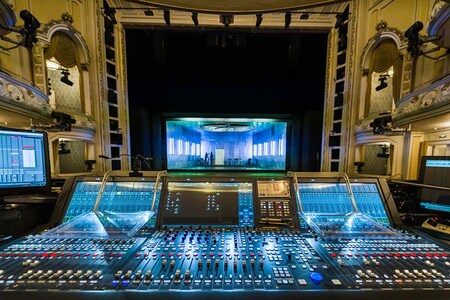
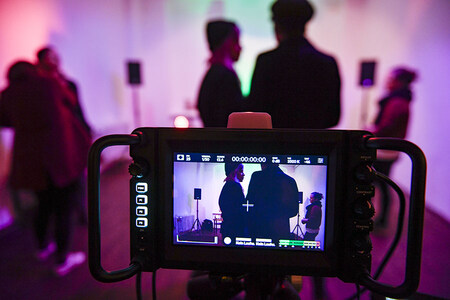
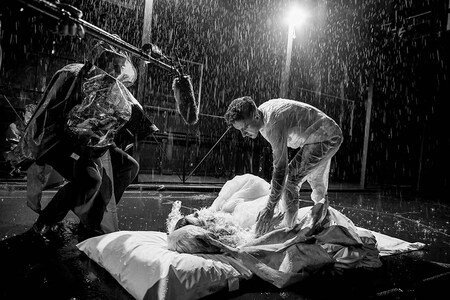
Media designers for image and sound are members of the technical departments of the Saxon State Theatres (State Opera or State Theatre) and are in charge of all audiovisual aspects of the performance. They need to be familiar with equipment such as diverse microphones, loudspeakers, cameras, projectors, mixing consoles and associated software. In addition to performances under live conditions, media products are pre-produced in the sound and video studio, where media designers employ their skills in recording, editing and cutting.
Requirements
A good understanding of both electrical and information technology as well as manual dexterity are needed to be able to implement the technical designs specified by the stage director. Media designers collaborate closely with various departments of the respective theatres to ensure the smooth running of events. A willingness to work irregular hours, including weekends and public holidays, is essential.
Apprenticeship
Training to become a media designer for image and sound usually takes three years, culminating in a professional examination by the Chamber of Industry and Commerce. In-house training takes place in the sound and video departments at the Dresden State Theatre (Staatsschauspiel).
Metalworker specialising in construction
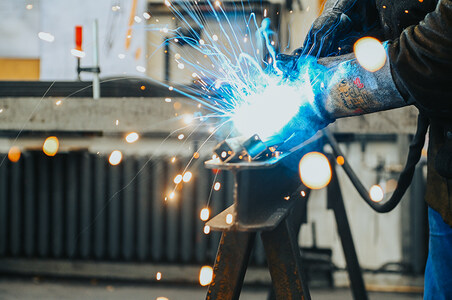
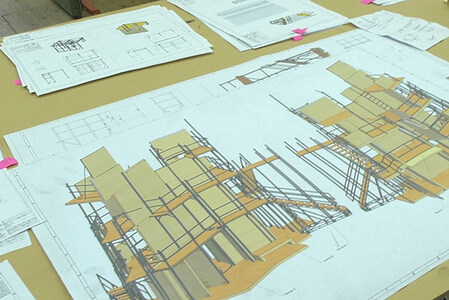
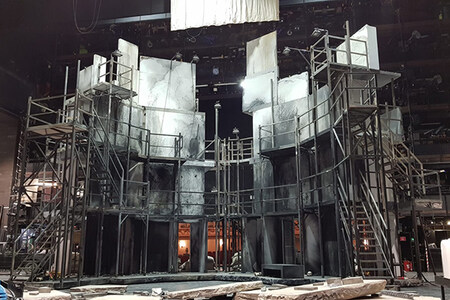
In the theatre, a metalworker manufactures all parts of a stage set that are made of metallic materials. This includes small parts such as brackets or other fittings to large load-bearing structures such as replicas of a ship or housing.
Precision and the ability to think in three dimensions are basic requirements for a metalworker to achieve good results. Generally, the metalworking shop works closely with other workshop trades such as carpenters and theatrical sculptors as well as other departments.
From the first saw cut to the last weld, the metalworker uses manual skills and machines to solve the tasks assigned to her/him.
Requirements
In addition to the entry qualifications, a metalworker at the theatre should be good with their hands and possess technical affinity as well as a spatial imagination, physical resilience and an interest in realising artistic ideas.
Apprenticeship
The apprenticeship as metalworker usually takes three and a half years, at the end of which you sit an examination organised by the Chamber of Industry and Commerce. In addition to the main in-house training in the scenery workshops, apprentices attend vocational school.
Set dresser
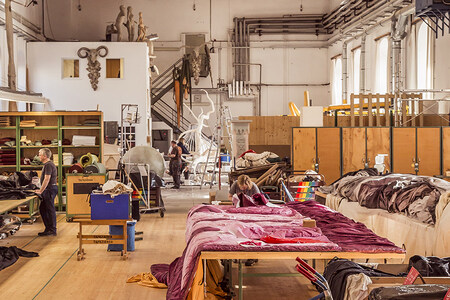
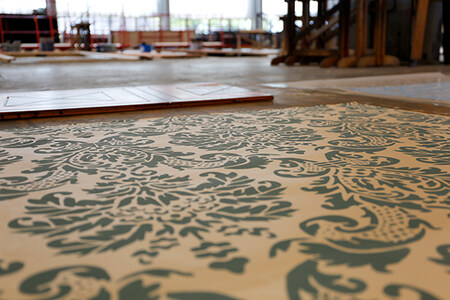

A set dresser (Raumausstatter) in a theatre company creates all props and scenery made of textiles. These are, for example, curtains, floor coverings, upholstered furniture, scenery flats, curtains and backdrops. The dimensions range from tablecloths to grand drapes. Hand in hand with the other trades in the scenery workshops, the set dresser implements the ideas of the stage designer. From the first cut to the last seam, the set dresser uses her/his manual skills and machines to solve a range of tasks.
Requirements
In addition to the entry qualifications, a set dresser should have manual skills and technical aptitude, an ability to think spatially, physical stamina and an interest in realising artistic ideas.
Apprenticeship
It usually takes three years to train as a set dresser, at the end of which you will sit an exam set by the Handwerkskammer. Alongside the main in-house training in the scenery workshops (upholstery, scenery, masking curtains and sun shades, set decoration and the laying of flooring), apprentices attend vocational school.
Shoemaker
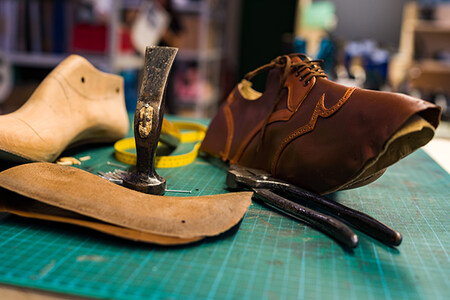

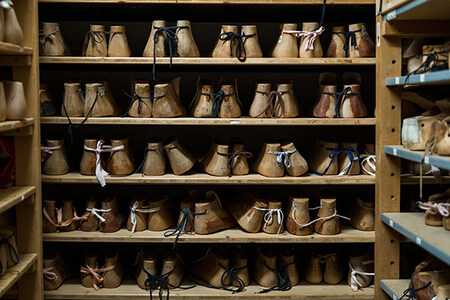
If the shoe doesn’t fit, you can’t sing, act or dance well. This is especially true in the theatre. Sturdy, well-fitting shoes provide the perfect finish to a costume, helping to ensure a successful performance. While many large theatres still employ their own shoemakers, the number is steadily decreasing.
In the theatre, shoemakers deal with all kinds of historical and modern shoe designs, such as particularly high shoes (chopine), riding boots, women’s shoes in men’s sizes, delicate pumps, cuirassier boots, ballet boots, etc.
But the day-to-day business also includes countless repairs. When a cast changes, new shoes have to be made or altered, often in a very short time. Frequently, it is also the shoemaker’s job to maintain the shoe collection.
Requirements
For the profession of shoemaker, you need good manual skills, an interest in costume and art history and the ability to work in a team. During your training, you will learn how to work with different materials as well as gaining basic knowledge of human anatomy, especially the foot.
Apprenticeship
It usually takes three years to train as a shoemaker.
Carpenter
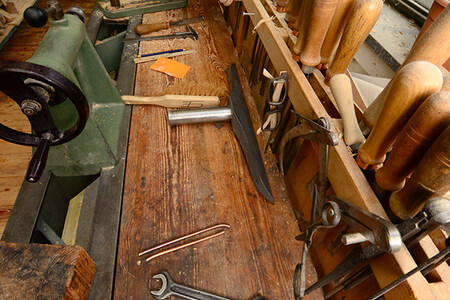
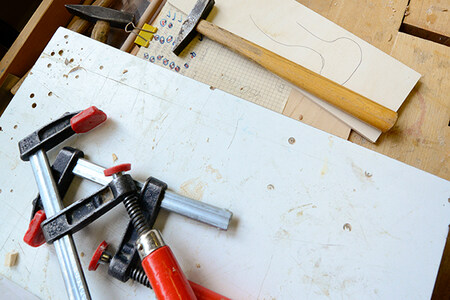
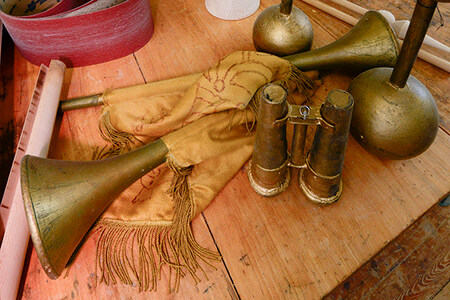
A carpenter employed by a theatre constructs the wooden parts of a stage set. These can be anything from floors to furniture, stairs and walls to entire houses. According to the blueprints supplied by the client, the scenery elements are generally built as plywood frames or steel substructures covered with plywood.
Precision and the ability to think in three dimensions are basic requirements for a carpenter to achieve good results. Generally, the carpentry workshop works closely with other workshop trades such as painting, sculpting and metalworking as well as other departments.
From the first saw cut to the last screw, the carpenter uses her/his manual skills and machines to solve a range of tasks.
Requirements
In addition to the entry qualifications, a carpenter employed at a theatre should be interested in realising artistic ideas.
Apprenticeship
In the initial training phase to become a carpenter, traditional wood joints are made by hand; only later is instruction given in the safe handling of woodworking machines.
An apprenticeship to become a carpenter usually takes three years.
Internships at the Semperoper and in the workshops of the Saxon State Theatres
- Internships for school pupils
- Internship in design
- Orientation internship
- Pre-study internship
- Practical semester and internship for students
Contact
Sächsische Staatstheater –
Staatsoper Dresden and Staatsschauspiel Dresden
HR Department
Theaterplatz 2
01067 Dresden
E-mail bewerbung@saechsische-staatstheater.de
Note: Thank you for your interest in training with us. As the number of enquiries for internships exceeds our capacity, we regret that we cannot respond positively to every application. Upon arrival, each application is processed and considered individually. Unfortunately, it is not possible to reserve a place for a later period.
Internships for school pupils
Internships are offered in the scenery workshops (sculpture, painting shop, carpentry, set decoration) and the costume workshops (women’s/ men’s tailoring) as well as in individual cases in stage technology/ event technology, lighting, sound and video. The internship normally lasts at least one week.
Application
Please send your application documents with a covering letter, CV and most recent report card as well as proof of any internships, courses and/or workshops you have already completed to the contact person named above.
The relevant department will decide on the awarding of an internship. The processing time in the various departments can vary greatly from between two to six weeks. Subsequently, you will receive notification of acceptance or rejection from our Human Resources Department. Each application is reviewed individually and carefully discussed to ensure that the required supervision of the intern can be integrated with the existing production schedule.
Internship: design
11th-year pupils of Dresden’s Fachoberschule für Gestaltung can complete their compulsory internship (a total of 20 weeks, with two weeks’ schooling alternating with two weeks’ internship) at the Semperoper in the areas of tailoring and theatrical sculpture.
Specialised internship in design
Cannot be offered at present due to capacity constraints.
Orientation internship
Orientation internships are possible in the scenery workshops (sculpture, painting hall, carpentry, set decoration) and the costume workshops (women’s and men’s tailoring) as well as in individual cases in stage technology, lighting or sound. Such internships last from a minimum of one week to a maximum of three months. Orientation internships are generally free of charge.
Application
Please send your application documents with a covering letter, CV and most recent report card as well as proof of any internships, courses and/or workshops you have already completed to the contact person named above.
Pre-study internship
Pre-study internships are offered in the scenery workshops (painting hall and theatrical sculpture), the costume workshops and occasionally in the field of stage technologies. They are compulsory before embarking on a university or college degree. These internships last between one and nine months (depending on the applicant’s needs and interests and the space/resources of each department). Please contact the above-mentioned contact person to discuss your potential internship.
The monthly internship salary is 255.65 EUR/month (gross). The length of holiday leave is proportionate to the duration of the internship (in accordance with the TV-L Azubi regulation for trainees).
Application
Please send your application documents with a covering letter, CV and most recent report card as well as proof of any internships, courses and/or workshops you have already completed to the contact person named above.
Practical semesters and internships for students
Practical semesters are offered in the scenery workshops (painting hall, theatrical sculpture, carpentry, set decoration), the costume workshops and occasionally in the field of stage technology as well as in dramaturgy. They are an integral part of a university/college degree. The duration of the internship is between one and six months (depending on the applicant’s needs and interests and the available capacities/resources of the department). Please contact the above-mentioned person to discuss your potential internship.
Student internships are not remunerated and there is no holiday leave.
Application
Please send your application documents with a covering letter, CV and most recent report card as well as proof of any internships, courses and/or workshops you have already completed to the contact person named above.
BFD Volunteering (Bundesfreiwilligendienst) in Culture and Education (BFD)

As part of the BFD programme in Culture and Education, it is possible to volunteer at the Semperoper in the departments of ballet administration, education, the historical archive, communication and marketing (two positions), the music library as well as with the Staatskapelle Dresden. The period of voluntary service is one season, i.e. from 1 September to 31 August the following year.
Applications are only accepted via the portal of the Landesvereinigung Kulturelle Kinder- und Jugendbildung Sachsen e.V., where all other relevant details can be found. The portal can be accessed by clicking on the following link:
The BFD Culture and Education programme gives individuals the chance to experience daily work in a theatre. Due to the intensive contacts with artists, staff and external partners, the volunteers gain deep insights into the diverse activities of a large cultural institution. There is also the opportunity to attend rehearsals, performances and premieres. The volunteers will see how creative problem-solving, structured and independent work and efficient time management become an integral part of the work processes as staff face new challenges every day.
Job profile: Semperoper Aktiv! (music theatre education)
Involvement in the following projects in the music theatre education department Semperoper Aktiv!:
- music theatre educational workshops in schools;
- music theatre clubs;
- holiday project;
- opera workshop (weekend workshops for children and young people);
Activities:
- assisting with music theatre educational workshops and projects (preparation, material creation and implementation);
- administration, correspondence with schools, IT;
- managing and maintaining library accounts and contact lists;
- research tasks;
- independent music theatre educational activities;
- observation of a selected production on Semper Zwei;
Opportunities:
The volunteer has the opportunity to get to know the diverse field of music theatre education over the course of a year. In practice, by assisting and independently teaching methods, as well as theoretically, through research into plays, specialist literature on music theatre education and regular exchange with music theatre educators. Becoming familiar with the working methods and methods of music theatre education should enable the volunteer to independently carry out a music theatre education project during the year.
Other:
Desirable qualities and skills: ability to work in a team, creativity, initiative, enthusiasm, flexibility, interest in opera, enjoyment of working with groups, experience of working with children and young people, ability to play a musical instrument/ability to read music an advantage.
The music theatre education department of the Semperoper Dresden arranges opera, ballet and concert visits and offers a range of activities for schools and individuals. The focus is on active participation. Further information is available at semperoper.de/aktiv
Registration on the website of the Voluntary Services for Culture and Education
Job profile: Historical Archives
The Historical Archive documents the artistic past of the Sächsischen Staatstheater and its various departments like a memory. Programme booklets, programme notes, historical photos and many other treasures provide a vivid picture of Dresden's musical and theatrical history over the past centuries.
The archive, which is unique in the German theatre landscape, is open to the public. Archive users can conduct research themselves free of charge by appointment; a processing fee is charged for the processing of enquiries by the archive staff and for related services.
Assistance in the Historical Archive:
- Indexing and archiving of documents and objects in an IT-supported database,
- support with academic research;
- assistance with archive projects in the area of public relations.
Activities:
- assisting with the indexing, cataloguing and packaging of archive materials;
- providing archive materials for internal and external use;
- registering objects and data in the archive database;
- Subject-related research for upcoming opera, theatre and ballet premieres and concerts by the orchestra
- Support with the preparation and realisation of in-house exhibitions;
- Collaboration on special projects in the area of public relations;
- Editorial assistance with publications of the Saxon State Theatres (programme booklets, magazine).
Opportunities:
- Insight into a theatre company;
- Insight into the archival work of a renowned multi-genre theatre;
- Personal contacts with research and cultural institutions;
- Further training in the use of common software.
Desirable characteristics and skills:
- an interest in culture, (musical) theatre, history and classical music;
- ability to work confidently with modern information technologies;
- independence, conscientiousness;
- organisational skills, team spirit, sense of responsibility.
Register on the website of the Voluntary Services for Culture and Education
Job profile: Communication & Marketing – Graphic Design/Social Media
The main focus of the work is to provide continuous and intensive support for the graphic design and social media activities of the Semperoper.
Activities:
The volunteer will gain in-depth insights into the corporate design of the Semperoper Dresden and learn about the workflows in this area. The volunteer will be introduced to the design programmes InDesign and Photoshop and should be willing to learn how to use the programmes independently using online tutorials. The volunteer will be involved in design-related routines, such as adapting posters, advertisements and match day posters to different formats, and will provide input for the graphic production of the Semper Magazine in the area of image editing and graphics.
In addition, the volunteer provides support for social media and web design and is also responsible for creating the daily press review.
Opportunities:
Due to the intensive contact with artists and employees, the volunteer gains deep insights into the workflows of a large cultural institution. Structured work and time management become an integral part of the work processes. In previous years, personal learning successes and positive experiences were reported back by the volunteers. After the year, the volunteers can/will usually study or work in the field of cultural management, media management or graphic design.
Other:
In addition to a general interest in culture and design, we expect applicants to have some initial creative experience (e.g. in drawing, painting, photography, typography or film) and an affinity for working with computer-aided design.
Registration on the website of the cultural and educational volunteer services
Job profile: Communication & Marketing – Press Relations
The main focus of the work is to provide continuous and intensive support for the press relations team.
Activities:
Specific areas of work include compiling the daily press review, managing social media channels (Facebook, Twitter, YouTube), research work and looking after journalists and camera crews. Depending on the creative abilities of the individual volunteers, there is also the opportunity to write texts for the various Semperoper media (Semper magazine, monthly programme, website, etc.) and to implement an independent project. Volunteers should be communicative and have a quick mind. In addition, good foreign language skills and MS Office skills would be desirable.
Opportunities:
Due to the intensive contact with artists, employees and journalists, the volunteers gain deep insights into the workings of a large cultural institution. The volunteers can gain insight into various software programs used in the theatre (e.g. TheaSoft) and acquire further computer skills. Structured work and time management become an integral part of the work process through new challenges every day. In previous years, the volunteers reported back on very personal learning successes and positive experiences. After the year is over, the volunteers can/will usually study or work in the field of cultural management, German studies or other areas of management and journalism.
Other:
We expect very good knowledge of German spelling and grammar. Writing short messages and texts (e.g. for Facebook and the Semper Magazine) should be desirable and enjoyable. Routine work, such as creating press clippings and press reviews, requires diligence and a keen interest in media.
Register on the website of the Voluntary Services for Culture and Education.
Job profile: music library
The music library works for all three areas and provides the singers, musicians and other employees of the house with the sheet music necessary for the performances. The volunteer supports the two employees in the department with his work. His/her activities cover all three areas.
Activities:
The main focus of the work in the sheet music library is on producing and preparing sheet music for opera and ballet premieres and for the concerts of the Sächsische Staatskapelle. The volunteer does extensive copying and binding work. He/she prepares the sheet music – scores, piano reductions and orchestral parts – according to the requirements of the conductors, directors and concertmasters. He/she is responsible for making jump versions, bowings and dynamic entries. Further work is involved in independently issuing and returning the sheet music. The volunteer participates in research work in the search for the required viewing and performance material. Newly acquired or adopted sheet music and textbooks are inventoried and added to the collection. The volunteer is responsible for creating invoices (list of monthly broadcasts by cost unit). He/she works independently with the data programme ‘Faust’ and begins entering the music library's inventory, which was previously recorded on index cards.
Opportunities:
During the voluntary cultural year, the young person can gain important experience in the preparatory work necessary for the creation of a production or the preparation of a concert. He/she experiences the work processes from the planning phase to the start of rehearsals and the performance.
A requirement for working in our field is knowledge of sheet music (playing an instrument).
Registration on the website of the Voluntary Services for Culture and Education
Job profile: orchestra management
The volunteer will work in the orchestra management of the Sächsische Staatskapelle Dresden.
Activities:
The field of activity includes supporting and assisting with the work and activities of the PR and marketing office of the Sächsische Staatskapelle Dresden. The volunteer can expect a varied mix of tasks related to the various advertising and press activities that arise in connection with the orchestra's concert activities and season planning, as well as maintaining various online channels.
Opportunities:
Due to the intensive contact with artists, employees and press representatives, the volunteers gain deep insights into the workings of a large cultural institution, particularly in the areas of orchestra management, marketing and public relations. We offer the opportunity to attend rehearsals, premieres and performances. Creative problem solving, structured work and efficient time management become an integral part of the workflow through new challenges every day.
We welcome applicants who have the following qualities and skills:
- an interest in music,
- openness and curiosity,
- a sense of responsibility and independence,
- an ability to communicate,
- commitment/dedication and flexibility,
- computer skills and a certain media literacy.
Register on the website of the Voluntary Services for Culture and Education.
Internship: stage director
Internships for stage directors are possible within the framework of new opera productions. Lasting approximately six weeks, these cover the entire period of staged rehearsals for a production from the initial conceptional meeting to the premiere. The internships offer diverse insights into the production process at the Semperoper, including the coordination of rehearsals, liaising with the individual theatrical departments, keeping a promptbook, preparing rehearsal schedules and much more.
An internship as stage director is suitable, for example, as pre-study work experience for a degree in stage direction or as a compulsory internship within your degree programme. Interested? Please send your application with a covering letter and CV to our Human Resources Department:
Sächsische Staatstheater –
Staatsoper Dresden und Staatsschauspiel Dresden
HR Department
Theaterplatz 2
01067 Dresden
Phone +49 351 4911 253
E-mail bewerbung@saechsische-staatstheater.de